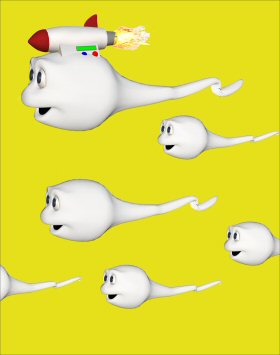 Intracytoplasmic sperm injection (ICSI), where a single sperm is injected into an egg to fertilize it, is a common technique to help infertile men father children. But researchers speaking at the European Society of Human Reproduction and Embryology conference say that identifying a healthy sperm for injection is more difficult than previously thought. They suggest that although the sperm chosen may appear quite normal, many of them in fact have DNA damage, which can decrease the chances of pregnancy.
Intracytoplasmic sperm injection (ICSI), where a single sperm is injected into an egg to fertilize it, is a common technique to help infertile men father children. But researchers speaking at the European Society of Human Reproduction and Embryology conference say that identifying a healthy sperm for injection is more difficult than previously thought. They suggest that although the sperm chosen may appear quite normal, many of them in fact have DNA damage, which can decrease the chances of pregnancy. Conrado Avenda�o, from the Jones Institute for Reproductive Medicine in Virginia, explained that embryologists would normally select the "best looking" sperm for injection. "This would typically be done by analyzing the sperm's shape under a microscope," he said. "A 'good' sperm by this criterion would have a regular oval head and a long straight tail. However, our research has shown that appearances can be deceptive."
Avenda�o studied sperm from ten infertile men and found that, despite appearing to be completely normal, many of the sperm had fragmented DNA. "DNA-damaged sperm has a highly deleterious effect on the ability to achieve a pregnancy. Even if damaged sperm are used and the woman becomes pregnant, the chances of miscarrying are significantly higher," he explained.
Worryingly, in the group of infertile men who took part in the study, between 20 and 66 percent of normal-looking sperm had DNA damage. DNA fragmentation can be caused by a number of environmental factors. "Oxidative stress, mainly due to reproductive tract infections, and apoptosis are the most studied, but other factors as age, smoking, exposure to air pollution and abnormal testicular warming are believed to increase the proportion of sperm DNA fragmentation," said Avenda�o.
To avoid the use of damaged sperm, fertility clinics should consider offering DNA fragmentation evaluation to couples with male factor infertility, suggests Avenda�o. "Our preliminary results using this new evaluation method show a clear negative correlation between the percentage of DNA fragmented sperm and the embryo quality and pregnancy outcome," he said. "Our work has shown that normal sperm morphology alone should not be used as the unique attribute for the selection of sperm for ICSI. New methods that allow an accurate separation of sperm with intact DNA should be sought."
Related:
Sperm Abnormalities Linked To Folate Levels
Mutant Sperm Could Be Cause Of Genetic Diseases
Sperm Banks In Need Of Makeover, Says Fertility Expert
Sperm Banking A Good Investment For Cancer Patients
New Sperm Sorting Method Improves Fertility
Source: European Society for Human Reproduction and Embryology

